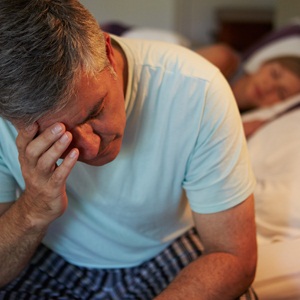
Older adults with pain for more than a day are more likely to report trouble sleeping years later, according to a new study.
The risk of long-term sleep problems was even higher for people reporting widespread pain in the survey.
Lifestyle changes and pain
It might not be just the pain that's leading to insomnia, the researchers say. Instead, much of the connection could be explained by lifestyle changes that often happen due to persistent pain, said lead author Nicole K.Y. Tang of the University of Warwick in Coventry, U.K.
"Although we know that people with chronic pain are more likely to report problems sleeping than people without any pain, we know very little about how the presence of pain leads to the development of insomnia," said Tang.
Tang and her team mailed questionnaires to all people age 50 or older registered with general medical practices in North Staffordshire, U.K.
People with pain lasting more than one day in the previous month were asked to shade the area of pain on a blank body diagram.
Read: Poor sleep linked to pain in older adults
Researchers considered those with pain on both sides of the body, above and below the waist, and in the bones of the head, spine or ribs to have 'widespread pain', while the others had 'some pain'.
Assessing sleep
Participants were also asked to complete a sleep questionnaire. Anyone with trouble falling or staying asleep, waking early, and waking up feeling tired and worn out on most nights of the last month were put in the insomnia category.
Three years after the original survey, the researchers sent out repeat questionnaires. Altogether they had answers from 6,676 people.
About 3,000 had some pain at the beginning of the study, while about 1,800 had none and 1,800 had widespread pain.
Read: Your pain may affect your spouse's sleep
At the beginning, most people with each kind of sleep problem had widespread pain, fewer had some pain – and very few had no pain at all.
Three years later, compared to people without pain at the start, the people with pain were more likely to say their sleep problems had worsened, according to results in the journal Rheumatology. And those with widespread pain at the start were twice as likely to develop insomnia as those with no pain.
Relationship between pain and insomnia
This relationship held even when age, gender, socio-economic class, education, anxiety and depression were taken into account, the authors write.
The authors suspect that physical limitations and reduced social functioning might explain a lot of the relationship between pain and insomnia.
People with pain often, but not always, reduce their physical activity levels and social interactions, Tang said.
"These are common but not inevitable consequences of pain," she told Reuters Health by email. "We believe that engagement in physical and social activities are important to promoting sleep, as it generates sleep pressure and brings exposure to light and mental stimulation that are essential for the regulation of our circadian rhythm."
Read: Eat better, sleep better
But these two possible consequences of musculoskeletal pain may not explain the whole picture, said Silvia M. Bigatti, an associate professor in the Richard M. Fairbanks School of Public Health at Indiana University – Purdue University Indianapolis.
Bigatti was not part of the new study.
Treating insomnia
"All these authors are able to show is that these four variables are related, and importantly, that they were able to show which came first because they studied these patients over time," she told Reuters Health by email.
But the study does emphasize that trying to treat insomnia alone may only be treating the symptom of another medical problem, like pain, she said.
"This is true for patients with this kind of pain, but also for anyone with insomnia," Bigatti said. "Try to figure out when it started, when it is worse, when it is better, and find which precursor to treat."
Treatment will vary based on the pain condition, and there are non-pharmacologic therapies available, she said.
"For older people with pain, keeping physically and socially active may help reduce the risk of developing insomnia," Tang said.
Read more:
6 ways to prevent insomnia
What are sleep disorders?
Insomnia: 10 medical causes
Image: Man suffering with insomnia from Shutterstock
See breaking news and the hottest health tips before anybody else by joining South Africa’s biggest and best health community, like health24 on Facebook now!




 Publications
Publications
 Partners
Partners











